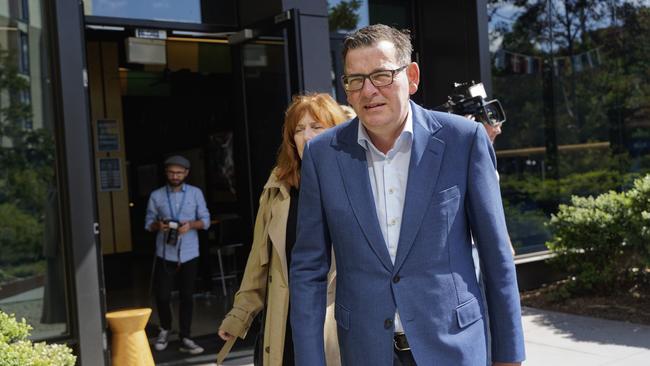Andrews government to double wage cap for public servants amid cost of living pressures
Changes to the cap on wage increases for public servants leaves Victoria trailing behind Queensland, NSW and Western Australia, the union says.
Victoria
Don't miss out on the headlines from Victoria. Followed categories will be added to My News.
Victoria’s public sector union has slammed the government’s wages policy, declaring it a betrayal.
Responding to news the government would double its cap to 3 per cent, a Community and Public Sector Union spokesman said the figure was a betrayal and wouldn’t cut it.
“It leaves Victoria a long way down the public sector pay ladder with Queensland, NSW and Western Australia leading,” he said.
“Interstate pressure is now on Victoria when we’re already short staffed.”
The spokesman said the aim to provide staff with extra money for productivity improvements was “largely illusory”.
“It would be almost impossible for public service departments and agencies to fund money out of their own budgets, given the savings that have been imposed already and have been threatened into the future,” he said.
The Andrews government has doubled the cap on wage increases for public servants amid soaring inflation.
But the move is likely to put even more pressure on the state’s strained budget.
Under Victoria’s wages policy, the government sets a maximum rate that it expects the salaries of police, health workers and others paid by the state to go up each year.
This is then used as it’s bargaining position for pay deals with union and private companies also use this figure as a guideline for their own agreements.
Treasurer Tim Pallas on Tuesday confirmed the state would increase its wages cap from 1.5 per cent a year to 3 per cent.
Sign-on bonuses will also be available as a lump sum, up to 0.5 per cent of their agreement, and public servants will be able to access additional entitlements through productivity increases.
The government had initially proposed to keep the 1.5 per cent figure last year, but was forced to review this amid a backlash and cost of living pressure.
Melbourne’s inflation rate is at its highest in 30 years, meaning many Victorians locked into lower pay agreements are going backwards as price rises and interest rates are hiked.
The policy will apply immediately, including to enterprise agreements that have expired and are still being negotiated.
“Our public sector workers do a great job serving their fellow Victorians and we’re proud to support them,” Mr Pallas said.
“In addition to wage increases, workers will be able to obtain a sign-on bonus while productivity improvements will bring the potential for further advancement of conditions.
“The policy provides fair outcomes for employees while being responsible as we deal with the types of budget challenges faced by families, businesses and governments across the world.”
It comes as high debt and massive interest expenses has forced the government to start looking at cutting things that aren’t election commitments or frontline services.
Last week, the Herald Sun revealed they had asked departments to cut one in 10 staff.

Premier Daniel Andrews said the pay increase didn’t mean staff cuts were guaranteed.
“We had provisioned for a pay increase but obviously given where inflation is at, we needed to adjust that up,” he said.
“That will be fully accounted for in the Budget.
“The Budget will be delivered in May and I’m not here to necessarily foreshadow in great detail.”
Mr Andrews said he would spend the upcoming weeks in back-to-back meetings with senior colleagues ahead of the Budget.
“I just want to be clear this is not the same Budget that it was five years ago,” he said.
“We had to, for the best of reasons in the worst of times, go and borrow tens of billions of dollars to use the Victorian state budget to protect household budgets, to protect businesses, to protect health and save lives.
“We will deliver all of our election commitments, but there’s going to have to be some very difficult choices made. We don’t shy away from that.”
Police Association of Victoria boss Wayne Gatt said the union will continue to pursue the case for better pay.
“As we prepare to enter negotiations with Victoria Police and the government, we will vigorously press the case for our police and PSO members to be fairly compensated over the next four years, with the cost of living pressures and the extremely challenging nature of their jobs, central to our claim,” he said.
“The government has a job to do in managing its budget. Our members have a budget at home as well. Our job is to help them manage theirs.”




